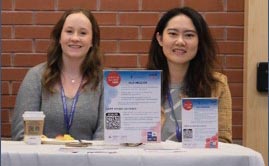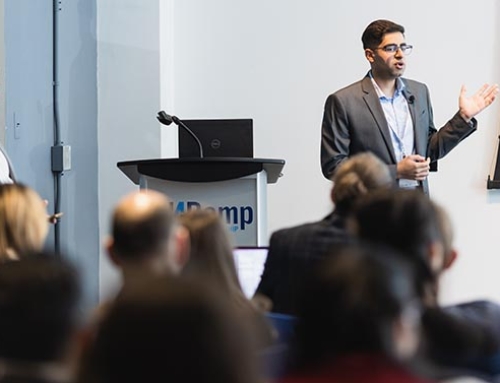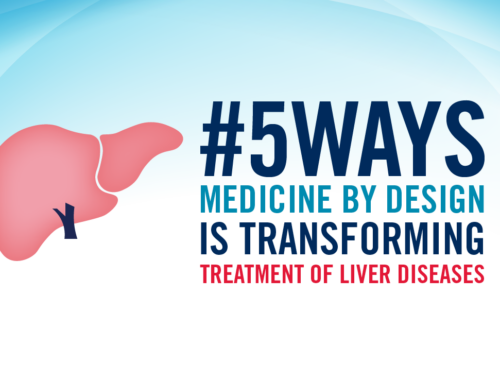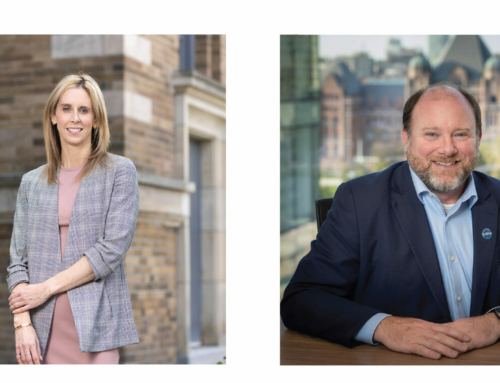
Speakers Imogen Coe (left), professor at Toronto Metropolitan University, and Anthony Wensley (right), member of the Toronto Initiative for Diversity and Excellence (TIDE) and a professor emeritus, University of Toronto Mississauga.
On Jan. 27, the Working Towards Inclusivity Symposium brought around 100 trainees from different STEM disciplines across Toronto together to recognize and reflect on challenges relating to inclusion, diversity, equity and accessibility (IDEA) in research laboratories.
The event gave trainees — which includes graduate students, post-doctoral fellows, research associates, and undergraduate researchers — a forum to think about and reflect on issues related to IDEA in their own labs and experiences.
The event was a collaboration between Medicine by Design’s Healthy & Inclusive Labs Committee and the University of Toronto’s Working Towards Inclusivity in Chemistry Toronto (WICTO).
The mission of the Healthy and Inclusive Labs Committee is to cultivate lab environments where all members feel empowered, supported, and valued. This goal aligns with the mission of WICTO, which is to dismantle oppressive systems that persist within academia to make the university a more equitable and safe space for everyone. The symposium offered an opportunity to provide resources and create open forums for discussion on IDEA, mentorship, and mental well being.
Medicine by Design’s Healthy & Inclusive Labs Committee is currently led by Kathryn Lye, a post-doctoral fellow at Sinai Health System, and supported by committee members, YingShan Ma, Chantel Campbell and Mina Vaez Ghasemi, PhD students at U of T.. The Healthy & Inclusive Labs Committee welcomes interested researchers from diverse disciplines to participate in future events and/or join the committee.
Lye and Ma led an interactive component of the event, presenting case studies to attendees, who came from Toronto area universities including the University of Toronto (U of T), Toronto Metropolitan University (TMU), and York University.

Medicine by Design Healthy and Inclusive Lab Committee chair Kathryn Lye (centre) and YingShan Ma (right), committee member, led an interactive session at the event.
Event explores themes like bias and diversity
Speakers Imogen Coe, a professor at the Department of Chemistry and Biology at TMU, and Anthony Wensley, a professor emeritus, U of T Mississauga, and a member of the Toronto Initiative for Diversity and Excellence (TIDE), explored ideas such as types of unconscious biases in research, how diversity makes science better, and how inclusivity drives creativity and innovation in science and research by fostering a culture where individuals can freely contribute.
Coe has advised academia, government, and industry on best practices and approaches to improve IDEA in STEM, particularly in the Canadian post-secondary education sector.
In her session, Coe gave a plenary lecture on practicing diversity and incorporating it into the lab to improve research. She also highlighted the importance of creating a ‘psychological safe space,’ where individuals feel comfortable to reflect on their background without judgment. A portion of her discussion focused on understanding bias and how it’s influenced by heuristics, the brain’s mental shortcuts to simplify complex problems and avoid cognitive overload.
In Wensley’s workshop, participants examined types of biases persisting in research and potential ways to deal with them. The TIDE initiative starts interactive conversations about evidence-based inclusion, illustrates common patterns of (unconscious) bias, provides practical tools to mitigate bias in academic practices and processes, and discusses promising ways to create more diverse and equitable unit cultures.
Case studies to examine biases and assumptions
As part of Wensley’s workshop. Lye and Ma created case studies to explore real-world scenarios challenging IDEA principles in lab settings.

Kathryn Lye (left) and YingShan Ma (right) at the Healthy and Inclusive Labs information table.
The case studies were inspired by real-life observations and were designed to encourage attendees to think about IDEA principles throughout the event. For example, one case study presented a situation where a supervisor in a lab that already had a demanding work schedule advised a trainee to work more on evenings and weekends despite the trainee having young children. This particular case explored how workplace cultures may disproportionately impact those with diverse responsibilities, and the questions that accompanied the case encouraged a discussion about inclusive approaches to acknowledging these impacts.
After presenting the case studies, trainees were asked to reflect on the situations through question prompts. Then the case studies were discussed in an interactive workshop and debriefing session, led by Wensley and supported by Coe.
The event also included a “how-to-network” workshop, flash talks from trainees with broad research interests, and a networking dinner.
If you want to get involved with the Healthy & Inclusive Labs Committee at Medicine by Design or have any questions, please contact info.mbd@utoronto.ca.





